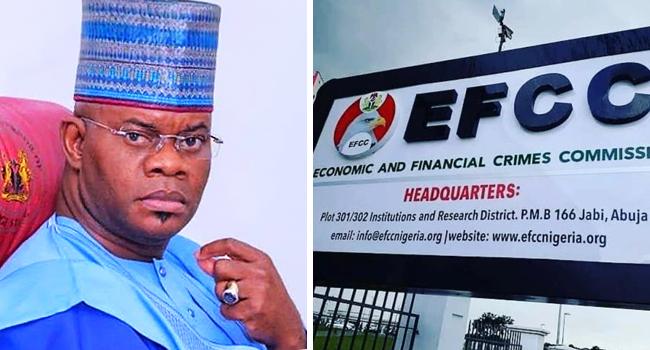The Economic and Financial Crimes Commission (EFCC) has formally opposed a request by embattled former Kogi State Governor, Yahaya Bello, to travel abroad for medical treatment, citing legal irregularities and potential flight risk concerns.
Bello, currently standing trial over an alleged ₦80.2 billion fraud, submitted the travel request during a court session held on June 27, 2025, before Justice Emeka Nwite of the Federal High Court in Abuja. His lead counsel, J.B. Daudu (SAN), argued that the former governor’s deteriorating health required urgent medical attention not available within Nigeria, even in the hospital he personally built in Kogi State.
Daudu appealed to the court’s discretion, emphasizing that Bello has remained within Nigerian borders for over eight years and has no record of criminal conduct abroad. He assured the court that Bello posed no flight risk and suggested that the judge could stipulate a strict return date to ensure compliance.
However, EFCC’s lead prosecutor, Kemi Pinheiro (SAN), vehemently challenged the request, describing it as procedurally flawed and strategically suspicious. Pinheiro informed the court that Bello had made similar applications in other courtrooms, an act he said could create judicial confusion and potentially disrupt the trial’s integrity.
Read also:
- EFCC boss urges South East Development Commission to uplift region
- EFCC advises students against misusing the internet
- EFCC boss inaugurates NDDC projects in Bayelsa
Pinheiro outlined five key objections, beginning with the argument that the application failed to notify Bello’s bail sureties, a critical requirement given the gravity of the case and the risk of absconding. He reminded the court that the former governor is accused of laundering money across multiple jurisdictions, including Dubai, the United Kingdom, and the United States, making him subject to possible international arrest once outside Nigerian borders.
The EFCC lawyer further cast doubt on the legitimacy of the medical documents presented by Bello’s legal team. According to him, the medical report lacked professional authentication, with no verified credentials of the issuing doctor or detailed diagnosis. Pinheiro dismissed the medical claims, specifically low potassium levels, as conditions that could be treated locally and wryly suggested that Bello should consider receiving care at his own hospital in Kogi, which is only two hours away from Abuja.
He concluded by warning that permitting Bello to travel could derail ongoing proceedings and compromise the enforcement of justice, particularly in a high-profile corruption case with global financial implications.
Daudu, in rebuttal, insisted that the EFCC’s arguments were unfounded. He maintained that notifying the bail sureties was not mandatory and argued that any travel alert issued against Bello had become redundant since his formal appearance in court. He urged Justice Nwite to prioritize his client’s right to health and allow him to access treatment abroad.
Justice Nwite is expected to rule on the application in the coming days as public attention on the high-stakes trial continues to mount. The outcome could set a significant precedent in Nigeria’s ongoing fight against corruption and the treatment of politically exposed individuals facing criminal prosecution.






